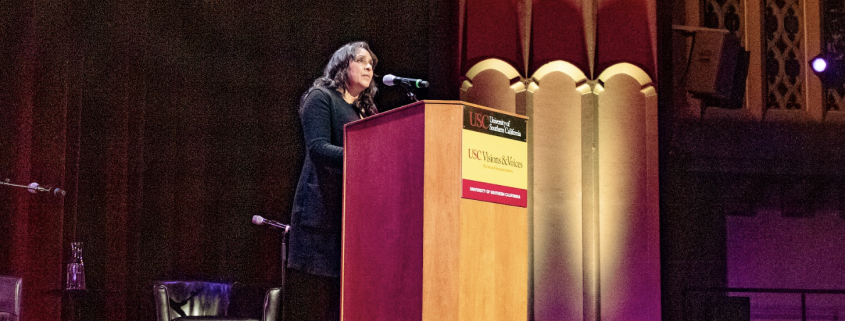Pulitzer Prize winner Natasha Trethewey speaks to USC community

Students and professors at Bovard Auditorium were treated to an evening with Natasha Trethewey Tuesday, where the poet performed a book reading from her newest memoir, “Memorial Drive: A Daughter’s Memoir,” and answered questions on meanings of family, race and history.
Trethewey is a Pulitzer Prize winner for her book “Native Guard,” a two-time poet laureate of the United States and the holder of a plethora of awards and fellowships, such as the Rebekah Johnson Bobbitt Prize in Poetry for Lifetime Achievement. She currently serves as a Board of Trustees professor of English at Northwestern University.
Within her reading of “Memorial Drive,” Trethewey performed a deep dive into her memories, revisiting the crime scene where her mother was murdered nearly 30 years prior and expressing her enduring relationship with her.
Reading an excerpt from her prologue, Trethewey said, “Vowing never to return, I took with me what I had cultivated all those years: mute avoidance of my past, silence and willed amnesia buried deep in me like a root. Nor could I have anticipated then that anything would ever draw me back to that city … a reminder of a past I was determined to forget even as I tried to honor her memory in every way I knew how.”
The book is about surviving traumas, both personal and national, as an African American woman. It’s about grief and the bond between mother and child, and about discovering the importance of place and forging herself into a writer.
Trethewey also responded to audience questions in an event, marking the continuation of a series of speakers that have come to USC as part of The Subir and Malini Chowdhury Foundation Distinguished Speaker Series. The series is held by Visions and Voices, an initiative in the arts and humanities at USC that launched in 2006.
David Delgado, the production specialist for Visions and Voices, is vocal about the importance of holding events in the arts and humanities for students at USC.
“The arts are absolutely pivotal to our students’ education, not just here at USC, but at any institution of learning,” Delgado said in an interview with the Daily Trojan. “It goes hand in hand [with] what individuals are learning from textbooks, but to actually experience art in a live and communal form, we believe is pivotal to the growth of our community.”
Recent empirical evidence suggests that arts participation is related to behaviors that contribute to the health of civic society. Delgado emphasized the benefits of providing an education on culture, saying that, “we want our Trojan students to be as well rounded as possible, not just learning science and math and engineering, but also the arts and humanities, which fill the soul as well as the mind.”
The event series is designed to bring internationally renowned authors to campus. Along with Trethewey this year, the University has also hosted distinguished authors Michael Ondaatje and Zadie Smith.
Alex Flores, a freshman majoring in public relations and an audience member, is a big fan of Trethewey’s work. They spoke of how much it meant to them to be able to see her speak and read from her work in person.
“I loved everything that she wrote about, even though we come from two very different worlds. We’re two completely different people, but I kind of felt like we were one,” Flores said. “[The reading and] interview [were] everything I could have hoped for.”
Trethewey answered questions about her childhood being raised by a Black mother and white father in segregated Mississippi. She recounted how her family was targeted by hate groups, including the Ku Klux Klan and how the public admonished the relationship between her parents.
Trethewey said recalling her past provides clarity for current affairs, saying that “even though I’m talking about half a century ago, so much of [these events] has an increasing resonance right now.”
As the Supreme Court is reportedly leaning toward ending affirmative action in the near future, the removal of Confederate statues perennially remains on the agenda of discourse in many Southern states. Last week, the Georgia Supreme Court allowed a lawsuit objecting to the removal of Confederate statues from downtown Covington to move forward.
“I think about contests over Confederate memorials,” Trethewey said. “Things that people think have been expelled long ago. Issues around civil rights; the way that, even in the language which is used against same-sex marriage, was the same language deployed against interracial marriage.”
Tripp Carrington, a freshman majoring in narrative studies and audience member, decided to attend the event after reading one of Trethewey’s works in his American Literature class. Carrington said he found the reading to be a valuable experience.
“I thought that the reading was beautiful, especially to hear writing from the author’s own voice is always valuable,” Carrington said. “She was gracious enough to stay back, answer questions. I found it really interesting and beneficial for anybody interested in literature.”

